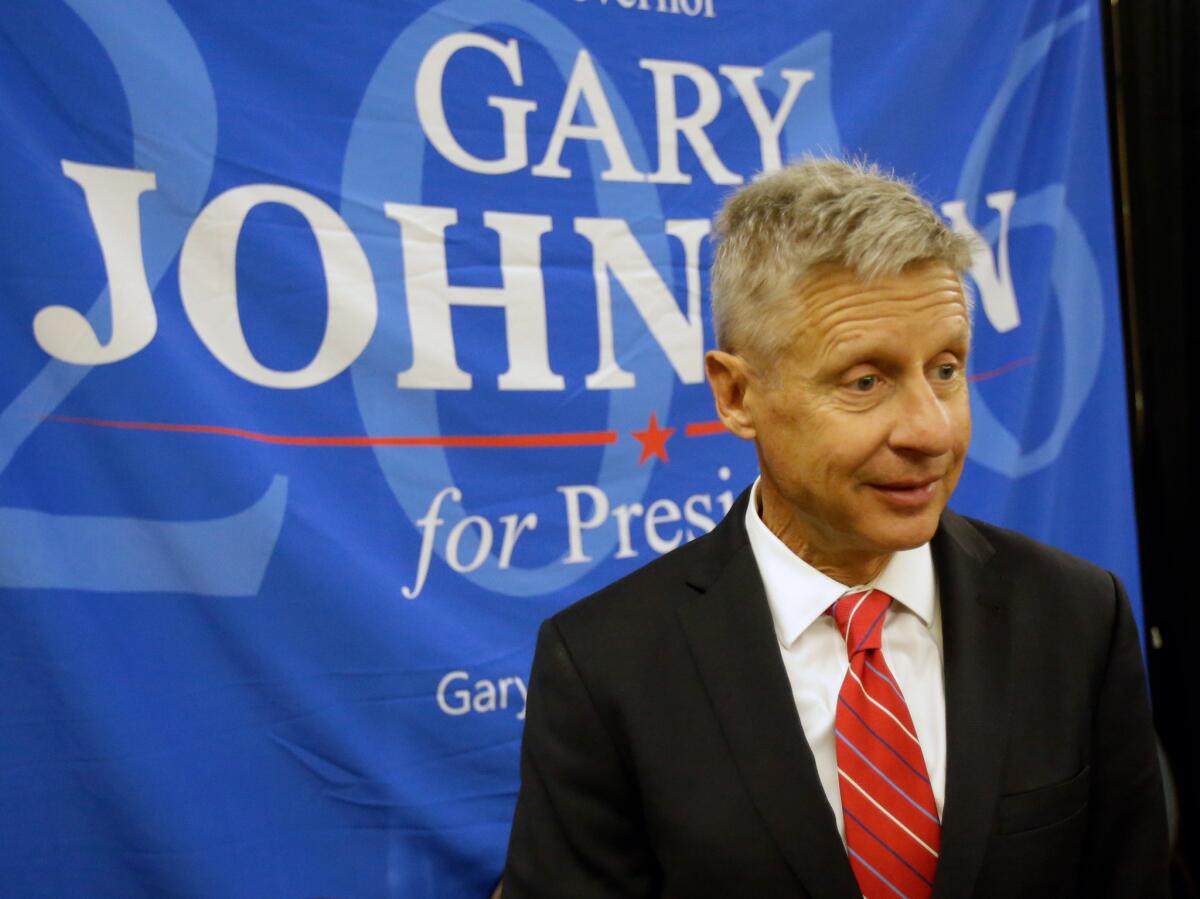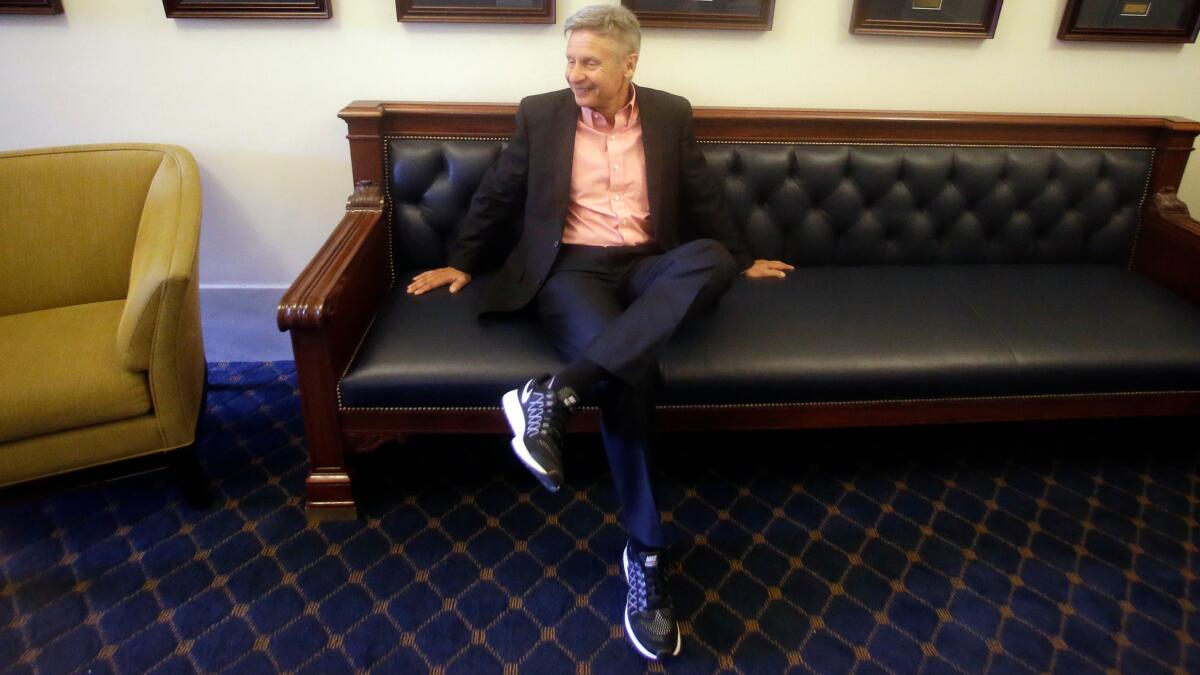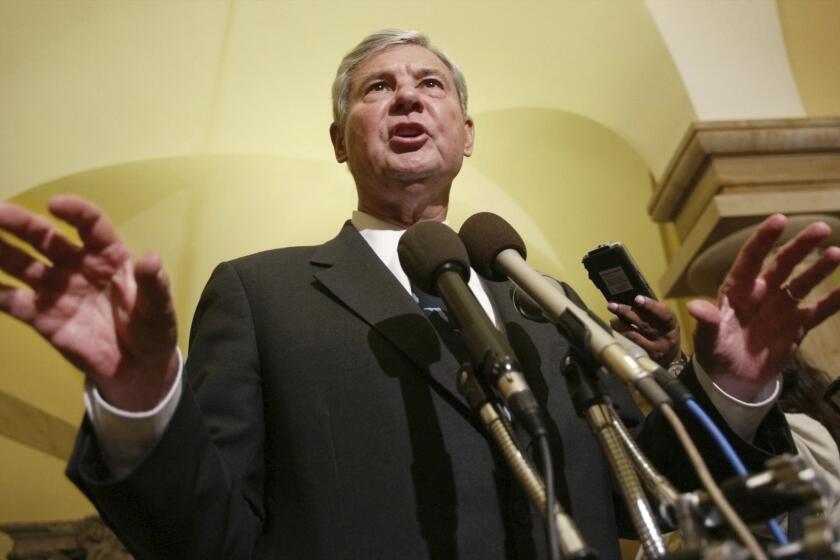Libertarians hope voter frustration with Trump and Clinton will create a ‘perfect storm’

Libertarian presidential candidate Gary Johnson speaks to supporters and delegates at the National Libertarian Party Convention on Friday.
The blockbuster Broadway musical “Hamilton” served as a surprisingly apt soundtrack to the Libertarian Convention this weekend, where party faithful gathered in Orlando to pick a presidential ticket.
Gary Johnson, who won the top slot Sunday, opened and closed his speeches to the delegates with a pair of songs from the musical, ironically celebrating the proponent of a central banking system that Libertarians despise. One had the refrain: “I am not throwing away my shot.” The other: “We are outgunned. Outmanned.”
Such is the position Libertarians find themselves in during this unruly election season. The lesser-known party has an unrivaled chance to tap into voters’ dissatisfaction with the likely nominees of the two major parties. But it faces daunting odds in actually capturing the White House.
After a raucous nominating convention, party activists settled on Johnson and William Weld, the former Republican governor of Massachusetts, as their party’s ticket. The pair promised that their governing experience, coupled with media savvy and fundraising heft, would propel the party to greater relevance.
“The two-party system is broken,” Johnson, the former governor of New Mexico and the party’s 2012 nominee, said in a Saturday afternoon speech, “and the Libertarian party has the opportunity this election to achieve major party status that each and every one of you has worked so hard for.”
Nearly 60% of voters view Donald Trump, the presumptive GOP nominee, unfavorably, according to a Real Clear Politics average of recent polls. Hillary Clinton, the likely Democratic nominee, doesn’t fare much better; about 55% of voters view her negatively.

A Wall Street Journal/NBC news poll last week found that 47% of Americans would consider voting for a generic third-party candidate.
“It’s scary for the country and a perfect storm for Libertarians,” said Jim Gray, a mediator from Newport Beach who was the party’s 2012 vice presidential pick. “We couldn’t have written it any better.”
Although some Republican establishment figures have openly speculated on efforts to draft an independent candidate, such as 2012 GOP nominee Mitt Romney, political experts say the Libertarian Party is the most viable vessel for anti-Trump and anti-Clinton efforts.
“The Libertarian Party is the big kid in town,” said J. David Gillespie, author of the book “Challengers to Duopoly: Why Third Parties Matter in American Two-Party Politics.” The party has already secured a spot on the ballot in 32 states and party leaders are confident they’ll appear on all 50 state ballots this November.
Nevertheless, Johnson, a former cannabis products executive, faces a steep uphill climb for the general election. He notched just over 1 million votes in 2012, about 1% of ballots cast.
The party’s fundraising is anemic compared with the resources of the two major parties. Libertarian candidates have been shut out of presidential debates. Many attendees lamented the average’s voters unfamiliarity with the Libertarian philosophy.
Libertarianism blends a laissez faire economic platform with a noninterventionist foreign policy and expansive civil liberties. Party members are generally in favor of abortion rights, gay marriage, legalized marijuana and other drugs, and a massive downsizing of government.
“Anybody who’s economically responsible — I won’t even say conservative — and socially inclusive — I won’t even say liberal — could be comfortable voting for us. That’s a lot of people,” Weld said.
But the fervent opposition to regulation embraced by Libertarian activists may, in its more extreme forms, alienate mainstream voters. Johnson was booed several times by the party faithful in a debate Saturday night for saying he would have voted for the 1964 Civil Rights Act and believes the government is justified in requiring drivers have licenses to ensure competency on the road.
Throughout the weekend, delegates weighed purity versus pragmatism, wrestling with the question Gillespie described as: “Are we going to be a pragmatic party that opens its doors to coalition building to include enough voters to actually win an election?”
The Orlando gathering was a distinctly grass-roots affair, with candidates readily accessible for mingling and jawing with nearly 1,000 delegates. Intricately costumed attendees from a nearby comic convention roamed the halls, adding an air of surreality to the proceedings.
Most skepticism was directed at Weld, Johnson’s vice presidential pick who struggled at times to convey his Libertarian bona fides to a convention of true believers.
“I was a little worried because we are the purists,” said Susan Aquino, a retired postal worker from Ventura, who ultimately was swayed to support Weld. “We’re always afraid of bringing in people that may still have ties to regular mainstream political community.”
But many delegates themselves were eager to emphasize their conversion from the more established parties.
Arthur Kerschen of Tucson said he had voted for Republicans Romney and John McCain in recent elections. But Trump’s candidacy had pushed him to the third-party option.
“If [Ted] Cruz or [Marco] Rubio or [Jeb] Bush had ended up being the candidate, I probably wouldn’t have considered it important to be here,” Kerschen said.
Nicholas Sarwark, the party’s chairman, said the party has seen a “surge of membership” since Trump in effect clinched the GOP nomination in early May. Sarwark said he expected to appeal to alienated supporters of Democratic hopeful Bernie Sanders as well. As of February, the party has about 400,000 registered members.

Two recent national polls found Johnson winning about 10% of the vote when matched up against Trump and Clinton. Candidates must be polling at 15% in major polls to qualify for the presidential debates, although the party is suing the Commission on Presidential Debates to set a different threshold.
Convention attendees offered varying definitions of what success in November would look like.
“The goal for the election is to have me invited to an inauguration party,” Sarwark said. But, he said, other milestones would qualify as a victory.
“If we can control the balance of power in the election, that’s success,” he said. “If we make our issues the defining issues of the election, that’s success. If we come out of this election … with even more more members, even more infrastructure, even more interest, that’s success.”
Aquino, the Ventura delegate, had an even simpler goal.
“Success is that people actually know who we are. They’ll know it’s OK to be Libertarian,” she said.
“You know, we’re more than marijuana,” she said.
ALSO
Op-Ed: Whitewater? Vince Foster? For Trump, it’s back to the ‘90s
Sanders says California primary is the ‘big enchilada’
California officials ponder: Now that they’re registered, how do we keep new voters interested?
More to Read
Get the L.A. Times Politics newsletter
Deeply reported insights into legislation, politics and policy from Sacramento, Washington and beyond. In your inbox three times per week.
You may occasionally receive promotional content from the Los Angeles Times.







